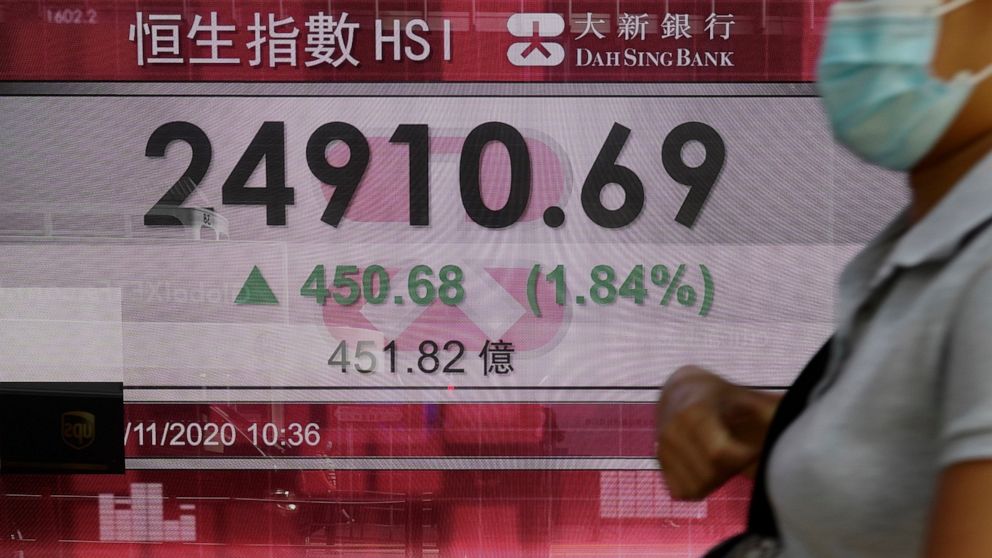Asian markets follow Wall Street higher ahead of election
Asian stock markets have followed Wall Street higher as investors await U.S. election results
BEIJING — Asian stock markets followed Wall Street higher on Tuesday as investors watched for U.S. election results, hoping a win by challenger Joe Biden in the presidential race might lead to more economic stimulus.
Benchmarks in Shanghai, Hong Kong, Seoul and Sydney advanced. Japanese markets were closed for a holiday.
Traders are betting that Biden might push for a bigger U.S. stimulus if he unseats President Donald Trump. That would require support in the Senate, which is controlled by Trump’s Republicans. Some incumbents, also up for re-election this week, face challengers from Biden’s Democratic Party.
On Monday, Wall Street closed higher amid indications Biden might be leading.
Many investors expect a “Democratic sweep, which is the key to unlocking Congress’s ability to deliver significant fiscal stimulus,” said Stephen Innes of Axi in a report.
The Shanghai Composite Index rose 1.1% to 3,271.71 and the Hang Seng in Hong Kong added 2% to 24,956.10.
The Kospi in Seoul gained 1.7% to 2,339.29.
In Sydney, the S&P-ASX 200 rose 2.3% to 6,087.80 after the Reserve Bank of Australia cut its key interest rate by 0.15 percentage point to a record low 0.1%. The rate cut was expected. The central bank governor, Philip Lowe, said the RBA was committed to doing what it can to create jobs. The Australian economy contracted during the first half of the calendar year, although Lowe said he expects official data will reveal some growth in the September quarter.
India’s Sensex opened up 0.9% at 40,131.45. New Zealand and Southeast Asian markets advanced.
Investors have swung between optimism the global economy was coping better with the coronavirus pandemic and unease that U.S. legislators have failed to approve new aid after expanded unemployment benefits that supported consumer spending expired.
Traders appear to be hoping a win by Biden and Democrats in the Senate might break the deadlock.
Markets are uneasy about rising infection rates in Europe, which are prompting more governments to reimpose restrictions on travel and business.
On Wall Street, the benchmark S&P 500 index rose 1.2% to 3,310.24. The Dow Jones Industrial Average gained 1.6% to 26,925.05. The Nasdaq composite picked up 0.4%,to 10,957.61.
Also this week, the U.S. Federal Reserve is due to announce its latest decision on interest rates on Thursday.
The U.S. Labor Department releases its monthly jobs report the following day.
About 130 companies in the S&P 500 are scheduled to report results this week.
Investors worry that a contested election would mean it could be weeks before the winner of the White House is certain.
Which party gets control of the Senate may be just as important as the presidency. If Democrats can gain complete control of Washington, many investors expect them to deliver a big dose of support for the economy.
Democrats and Republicans have been haggling about a stimulus renewal for months, since the last round of supplemental benefits for laid-off workers and other stimulus expired. But a deep partisan divide has so far stymied progress.
Investors and economists alike say the economy needs fresh stimulus, particularly when coronavirus counts are accelerating at troubling rates across Europe and much of the United States.
Such worries helped drive the S&P 500 to a 5.6% loss last week. That was its worst since March.
In other trading, benchmark U.S. crude oil added 5 cents to $36.86 per barrel in electronic trading on the New York Mercantile Exchange. It gained $1.02 on Monday to $36.81 per barrel. Brent crude, the international standard, was unchanged at $38.97 per barrel.
The U.S. dollar was nearly unchanged at 104.74 Japanese yen, compared with 104.75 yen late Monday. The euro weakened to $1.1652 from $1.1658.
![]()


